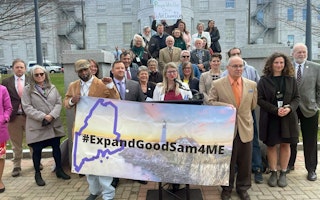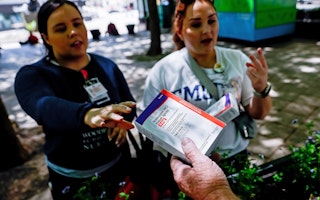Drug Decriminalization in the UK: Is There a Disconnect Between Politicians and the Public?
By Jonathan Price
It has taken far too long for the topic of drug decriminalization to be the subject of prime-time television debate. What was strikingly apparent from the discussions on Thursday night’s BBC Question Time in Plymouth, South West England, was the contrasting views of the studio audience and the guest panel, formed of members of Parliament and newspaper columnists. (If you're in the UK, you can view the program on BBC iPlayer.)
Labour and Conservative MPs David Lammy and Elizabeth Truss defiantly opposed decriminalization. Jeremy Browne, Liberal Democrat MP and minister of state in the Foreign and Commonwealth Office, was cautiously and uncomfortably ambivalent. And Melanie Phillips, columnist for the Daily Mail, vehemently criticized the drug policy reform movement.
The panel was asked whether drug users should go to jail, a question which was raised during Sir Richard Branson’s appearance at the Home Affairs Select Committee enquiry on drug policy earlier in the week. Sir Richard is a Commissioner on the Global Commission on Drug Policy and an advocate of drug policy reform.
The Question Time debate challenged the conventional wisdom that the UK public is unequivocally opposed to drug decriminalization and that political support for a more liberal drug policy is untenable.
On the contrary, it was fascinating to see that the arguments put forward by audience members echoed the views of experts working in the field of drug policy who advocate for decriminalization, such as those put forward by Release in a letter [pdf] to the prime minister last June.
“Addiction is a complex issue and difficult discussions are necessary to understand what works well for those who suffer because of drug abuse,” said one audience member. “If they legalized all drugs tomorrow, I’m pretty sure that everyone here would not go out and buy some heroin…The amount of money that is spent on incarcerating drug users could be better spent on treatment,” said another.
Mark Steel, an isolated voice of reason on the panel, noted that “if you listen to almost anybody who’s close to the problem, they will say the same. Just criminalizing it doesn’t work.” Indeed, a pharmacist in the audience explained that he dispenses methadone to people who use the medicine to break dependence on heroin. Such measures help individuals overcome problematic drug use and can lead to reduced crime rates in communities.
Another audience member pointed to recent cutbacks in law enforcement and questioned whether limited police resources should be devoted to going after people who use drugs.
Has this long-neglected debate shown that there has been a fundamental change in the public mood about drug decriminalization or that the public was not so starkly opposed in the first place? Is it time for UK politicians to follow the lead of the All Party Parliamentary Group on Drug Policy Reform by not only listening to the expert evidence in support of decriminalization, but also the views of their own constituents?
Jonathan Price is a research officer with the Centre on Migration, Policy, and Society (COMPAS) at the University of Oxford.


